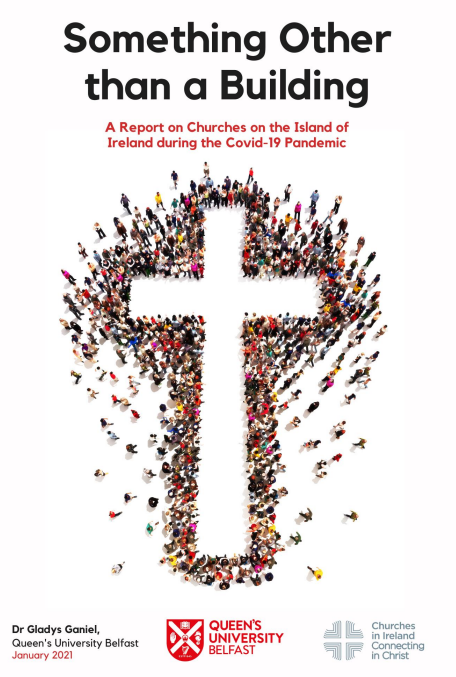
 During much of the Covid–19 pandemic, church buildings across the island have been closed for worship due to government restrictions on public gatherings. When churches have been open, strict social distancing protocols have limited the numbers who can attend in person.
During much of the Covid–19 pandemic, church buildings across the island have been closed for worship due to government restrictions on public gatherings. When churches have been open, strict social distancing protocols have limited the numbers who can attend in person.
You can hear an interview with the author of this report Dr Gladys Ganiel.
The report has been done in collaboration between Queen’s University and the Irish Council of Churches/Irish Inter–Church Meeting (ICC/IICM), this report takes its name from a Presbyterian minister’s remarks that this unusual situation has raised awareness that ‘church is something other than a building.’
The interviews with 32 clergy from across the island for this report complement an earlier survey of faith leaders on the island, the results of which were published in a May 2020 report, ‘People Still Need Us‘. The interviews were designed to follow up on key findings from the survey and to probe for new insights, providing deeper and more nuanced perspectives on how churches are navigating the pandemic. This report is best read in conjunction with the earlier research.
Irish Inter–Church Meeting co–chairs Bishop Brendan Leahy and Rev Dr Ivan Patterson noted: “As the abrupt disruption of initial lockdown measures extended into a longer term reality, Ireland’s Christian churches have journeyed alongside a suffering community, sharing in its grief and uncertainty about the future. The second report from Dr Gladys Ganiel on the impact of Covid–19 on faith communities on the island of Ireland documents valuable insights from this experience. As interviewees have stated, we cannot yet say exactly how the post–pandemic Church will have changed, but we can begin to reflect on the changes we would like to see, informed by the learning from this time of trial.
“The impact of Covid–19 has prompted us to ask searching questions about what it means to be a community of Christian believers in today’s society.
“As Co–Chairs of the Irish Inter–Church Meeting it has been a great encouragement to us to see how inter–church engagement has emerged as a priority at this time of significant challenges and pressures. This common Christian witness, and solidarity with other faith communities, has helped ensure that the significance of people’s spiritual wellbeing is not overlooked.
“It is a matter of concern that this report once again illustrates the significant pressures on clergy. Collaborative leadership has been highlighted as a significant area for attention and investment within churches, brought to the fore primarily by the experience of moving worship and outreach into the digital space, but with further potential in other areas of church life.
“A related matter that we suggest has perhaps, to date, not received the detailed consideration it merits, is that essential family–community connection that is at the heart of church life, but can so often be overlooked or taken for granted.
“As Covid–19 has caused people to be confined to their homes we have seen the defining influence of the home environment on people’s experiences — educational, professional, social — and life chances. From a church perspective, it has been a timely reminder of the importance of the family as the place where faith is shaped and nurtured. Re–building our communities, as churches and in the wider society, after this time of disruption, grief and loss, will begin at the level of the family.”
Done in collaboration between Queen’s University and the Irish Council of Churches/Irish Inter–Church Meeting (ICC/IICM), this report takes its name from a Presbyterian minister’s remarks that this unusual situation has raised awareness that ‘church is something other than a building.’
The interviews with 32 clergy from across the island for this report complement an earlier survey of faith leaders on the island, the results of which were published in a May 2020 report, ‘People Still Need Us‘. The interviews were designed to follow up on key findings from the survey and to probe for new insights, providing deeper and more nuanced perspectives on how churches are navigating the pandemic. This report is best read in conjunction with the earlier research.
Irish Inter–Church Meeting co–chairs Bishop Brendan Leahy and Rev Dr Ivan Patterson noted: “As the abrupt disruption of initial lockdown measures extended into a longer term reality, Ireland’s Christian churches have journeyed alongside a suffering community, sharing in its grief and uncertainty about the future. The second report from Dr Gladys Ganiel on the impact of Covid–19 on faith communities on the island of Ireland documents valuable insights from this experience. As interviewees have stated, we cannot yet say exactly how the post–pandemic Church will have changed, but we can begin to reflect on the changes we would like to see, informed by the learning from this time of trial.
“The impact of Covid–19 has prompted us to ask searching questions about what it means to be a community of Christian believers in today’s society.
“As Co–Chairs of the Irish Inter–Church Meeting it has been a great encouragement to us to see how inter–church engagement has emerged as a priority at this time of significant challenges and pressures. This common Christian witness, and solidarity with other faith communities, has helped ensure that the significance of people’s spiritual wellbeing is not overlooked.
“It is a matter of concern that this report once again illustrates the significant pressures on clergy. Collaborative leadership has been highlighted as a significant area for attention and investment within churches, brought to the fore primarily by the experience of moving worship and outreach into the digital space, but with further potential in other areas of church life.
“A related matter that we suggest has perhaps, to date, not received the detailed consideration it merits, is that essential family–community connection that is at the heart of church life, but can so often be overlooked or taken for granted.
“As Covid–19 has caused people to be confined to their homes we have seen the defining influence of the home environment on people’s experiences — educational, professional, social — and life chances. From a church perspective, it has been a timely reminder of the importance of the family as the place where faith is shaped and nurtured. Re–building our communities, as churches and in the wider society, after this time of disruption, grief and loss, will begin at the level of the family.
You can read Dr Ganiel’s Full Report HERE
